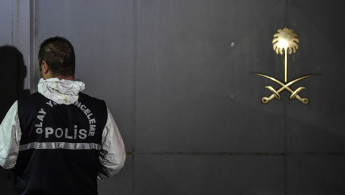Saudi-backed art festival in NYC blackballed over Khashoggi disappearance
Two institutions involved in the Arab Art and Education Initiative, the Middle East Institute (MEI) and Columbia University, told The New Arab they had misgivings about being connected to a Riyadh-backed scheme.
The concerns come amid growing global anger over the disappearance of Khashoggi, a prominent critic of Saudi Crown Prince Mohammed bin Salman, who vanished after entering the Saudi consulate in Istanbul two weeks ago.
Read also: Saudi military coroner dismembered Khashoggi after murder in front of consul: report
Gerald Feierstein, a policy chief at MEI, told The New Arab of the "shock and outrage" that he and his colleagues felt over the crisis and that they were "pulling out" of the festival in New York because it was connected to Riyadh.
"The institute believes strongly in the importance and sanctity of free speech and diversity of opinion," Feierstein, a former US ambassador to Yemen, said. His MEI board colleagues wanted a full, transparent probe into the incident, he added.
Avinoam Shalem, a professor who was set to host one of the festival's events at Columbia University, also expressed concerns about cooperating with organisers after what he called "the horrible case in Istanbul".
Shalem was set to host a talk with Ahmed Mater at the university on October 22. Mater, a Saudi doctor-turned-artist, is also director of Misk Art Institute, which bin Salman established last year to promote Arab art.
"I hope that it will happen, who knows? I'm thinking they might cancel it in the very last moment, if things go wrong. I'm thinking he won't get permission to leave the country," Shalem told The New Arab.
|
Should the event go ahead, Shalem said he would raise Khashoggi and Mater's links with the Saudi government at the start of the talk.
"We cannot just not address it, there is no way," Shalem added.
Speaking on condition that his name was not used, a Columbia University spokesman said the talk, about the redevelopment of Makkah, was "by no means contingent upon a funding stream or indicative of any relationship" with Riyadh.
Boon Hui Tan, a cultural director at the Asia Society Museum, which was set to host a panel discussion for the festival on October 16, said her organisation "did not receive any funding from the Saudi government for this event".
The Arab Art and Education Initiative is a year-long series of shows, talks and screenings of Arab art that started this month, involving the Museum of Modern Art, the Guggenheim Museum and other top galleries.
It was initially run by bin Salman's Misk Art Institute, but is currently led by Edge of Arabia, an art group that is funded by oil giant Saudi Aramco and others and was co-founded by Mater and British artist Stephen Stapleton.
"We believe it is now more important than ever to present these kinds of open and free cross-cultural platforms between the Arab world and US; allowing artists to present work, explore complex and often challenging subject matter with diverse communities across the city," Stapleton said via email to The New Arab.
The festival opens amid growing scrutiny on Riyadh over the disappearance of Khashoggi and a crackdown on Saudis who criticise bin Salman as he rolls out his ambitious Vision 2030 "reform agenda".
Similar concerns have been displayed over the Future Investment Initiative conference, an elite Saudi finance meet in Riyadh this month that is being boycotted by media firms and business chiefs over Khashoggi's disappearance.
Khashoggi, a former newspaper editor and prominent critic of bin Salman's war in Yemen and other policies, was last seen entering the Saudi consulate in Istanbul to get documents for his planned marriage.
Read also: Getting away with murder?
Bin Salman has received international praise and support for weaning the Saudi economy off dependence on oil profits, finding jobs for Saudi youth and loosening ultra-strict rules that banned cinemas and women drivers.
But he has also clamped down on intellectual freedoms with a wave of arrests of academics, women driving activists, writers and clerics, as Riyadh asserts itself regionally against perceived Iranian expansionism in Yemen, Syria and Lebanon.
This has coupled with efforts to burnish Saudi's image overseas. In the US, Riyadh has spent millions of dollars on Washington lobbying and public relations firms, as well as think-tanks.
James Reinl is a journalist, editor and current affairs analyst. He has reported from more than 30 countries and won awards for covering wars in Sri Lanka, Congo and Somalia, Haiti's earthquake and human rights abuses in Iran.
Follow him on Twitter: @jamesreinl



